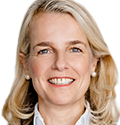ETFs: Market turbulence leaves its mark

Silicon Valley bank shock boosts turnover, but traders see ETF buying alongside selling. However, bank ETFs in particular have lost heavily.
14 March 2023. Frankfurt (Börse Frankfurt). The unrest is also noticeable in ETF trading after the collapse of the California Silicon Valley bank SVB. "We had a lot of volume on Thursday and Friday, and yesterday was no different," reports Torben Bendt of Lang & Schwarz. However, he adds, it's not just selling. "We see both selling and buying."
Holger Heinrich of Baader Bank reports stable turnover and even more buying compared to the previous week. "Despite falling markets, clients bought almost twice as many ETFs as they sold." Frank Mohr of Société Générale also still sees a buyer overhang on a weekly basis. "But that can already be different next week." ETFs are also affected, especially bank ETFs.
On Tuesday, a recovery is emerging on the stock exchanges, the DAX stands at noon at 15,182 points. Yesterday, Monday, the price slump had still continued. "The European stock exchanges offered a picture of misery or horror," explains Deutsche Bank, referring to the losses between 1.2 and 4 percent. The U.S. stock exchanges had closed after a very volatile course, however, inconsistent.
German shares popula
As always, high turnover and popular in the ETF business: MSCI World index funds. Mohr reports purchases, for example for the iShares MSCI World. Among Baader Bank clients, globally investing ETFs with ESG filters are particularly in demand, specifically Xtrackers MSCI AC World ESG Screened (IE00BGHQ0G80), UBS MSCI ACWI Socially Responsible (<IE00BDR5547>), UBS MSCI World SRI (IE00BK72HM96) and CSIF MSCI World ESG Leaders Blue (<IE00BJBYDQ02>).
As for European equities, the trend is also clear: they remain in demand. "At the moment, the proportion of ETFs that track European equities or, more specifically, German equities, is conspicuously high," notes Mohr. Investors* were betting on DAX products from Xtrackers (LU0274211480) or iShares (DE0005933931). "By the end of the week, however, it was more selling." At Baader Bank, European large caps were in demand (FR0010790980, IE00B4K6B022), but also small caps (LU0671493277). Bendt sees lots of buying for the Lyxor Core Stoxx Europe 600 (LU0908500753).
For U.S. stocks, the picture is mixed: Mohr says U.S. trackers are mainly on the sell lists, while Heinrich says they are on the buy lists (LU0274210672, FR0007056841), including the Russell 2000 (IE00B60SX402), which covers smaller stocks.

Mohr
Out with bank ETFs
Bank ETFs have been hit hardest by the turmoil surrounding the SRP. The iShares S&P 500 Financials Sector (IE00B4JNQZ49), for example, and the iShares Euro Stoxx Banks 30-15 (DE0006289309), which Société Générale customers often remove from their portfolios, have lost a lot of ground. "European banks are also seeing price losses," notes Mohr.
For the week, however, health care stocks have traded even more briskly - in both directions. Buying prevailed - still - in technology stocks, such as Xtrackers MSCI World Information Technology (IE00BM67HT60) and WisdomTree Cloud Computing (IE00BJGWQN72). Lang & Schwarz continues to bet heavily on the oil price with ETCs, often with leverage, such as the WisdomTree WTI Crude Oil 2x Daily Leveraged (JE00BDD9Q840).
Bond ETFs once again accounted for a larger share of turnover than usual at Société Générale. Money market trackers (FR0010510800) were bet on, but also U.S. government bonds with maturities of 7 to 10 years and European high yield bonds (IE00B66F4759).
Crypto ETNs in demand again
Business in crypto ETNs has picked up strongly again, according to Bendt. "Despite the turmoil in the markets, cryptocurrencies are showing strength." He reports predominant buying in 21Shares Bitcoin (CH0454664001), ETC Group Physical Solana (DE000A3GVKZ1) and VanEck Crypto Leaders (DE000A3GWEU3), which tracks a crypto basket. Bitcoin currently costs $24,305, down from a low of $15,790 in November.
Emerging markets in demand in January and February
In February, net inflows in the European ETF market totaled 7.5 billion euros, significantly lower than in January (17.7 billion euros), as reported by the Munich-based ETF analysis and brokerage house Crossflow. For January and February together, emerging markets were particularly in demand on the equities side: over 9 billion euros flowed into corresponding countries and regions - especially in Chinese public companies. In contrast, ETFs with North American underlyings saw an outflow of 3.4 billion, while products with pan-European indices collected a comparable volume in the same period. In addition, investors exited low volatility ETFs and healthcare trackers. Demand for bond ETFs slumped in February after high net inflows in January, according to Crossflow.
| Equities | |
| World | Purchases |
| Europe | Purchases |
| Germany | Purchases |
| USA | Purchases/Sales |
| Industries | |
| Banks | Sales |
| Oil and Gas | Purchases |
| Krypto-ETNs | Purchases |
by: Anna-Maria Borse, 14 March 2023, © Deutsche Börse
About the author
Anna-Maria Borse is a finance and economics editor specializing in financial markets/stock markets and economic topics.
Feedback and questions to redaktion@deutsche-boerse.com

Borse




